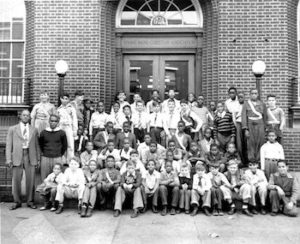
Black YMCA, Philadelphia. (1945)
*On this date, 1853, the first Black Young Men’s Christian Association (YMCA) was organized. The YMCA has long been a source for building community spirit and a sense of social responsibility among Black Christian men.
When the YMCA movement began in America in 1851, Black men were excluded from membership based on slavery and local racial segregation practices. In 1854, U.S. racial policies became a serious issue when they joined with those from Canada to form the Confederation of North American YMCAs. The first Black YMCA was organized in Washington, D.C., and lasted through the American Civil War.
The war dissolved the Confederation, and in America, the YMCA asserted that local associations were autonomous bodies and could govern themselves. African American men saw possibilities within the YMCA despite its failure to take a stand on discrimination. After emancipation, black associations were founded in Charleston, S.C., and New York City, among others. This occurrence, the interest of newly freed slaves, and the growth of YMCAs among black college students convinced the national YMCA to encourage the formation of black branches.
This movement began to thrive when the first Black International Secretary for Colored Work was employed in 1891. William A. Hunton, who had worked in Black YMCA branches in Ottawa, Canada, and Norfolk, VA., dedicated his life to expanding YMCA work among Black men. His staff grew to include Jesse Moorland, Channing H. Tobias, and others. This group was against segregation in YMCA work yet understood the positive aspects of having the space and time to train young Black men for leadership through voluntary and paid positions at the “Y.”
The first black YMCA in Atlanta was founded in 1894, and Harlem YMCA followed in 1901. Also in Virginia, civic organizer Ida Cummings was another influential advocate for a more diverse YMCA. World War I was a turning point for the YMCA; it was a time when the organization performed successful work with Black soldiers, dealing with health issues and literacy training. Following the war, the YMCA reassessed its racial policies and encouraged interracial dialogue. Yet it was not until 1946 that its national organization urged local branches to desegregate.
Desegregation closed many all-Black branches; however, the national YMCA has since remained a force in black communities. The work of the "Y" has expanded to include both women and men of all religious backgrounds. Local branches sponsor summer camps, residence halls, adult education, job training, and other activities and services. The organization gives its Jackie Robinson Award to someone who typifies good citizenship to youth each year. In 1979, Bob Lanier was the recepient. The YMCA continues to be relevant in America because of its commitment to creating functional communities and its ability to modify its approach in changing times.
The Encyclopedia of African American Heritage
by Susan Altman
Copyright 1997, Facts on File, Inc. New York
ISBN 0-8160-3289-0
Image: John Mosley